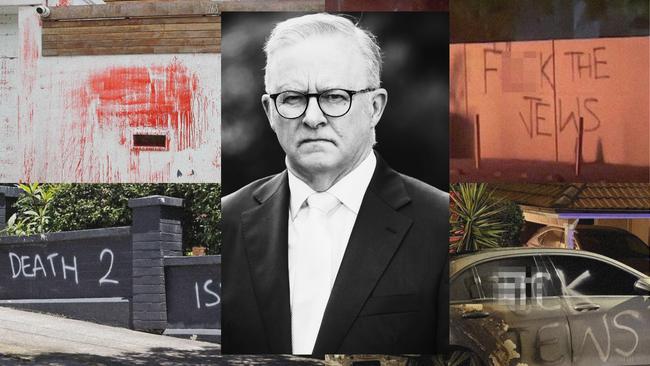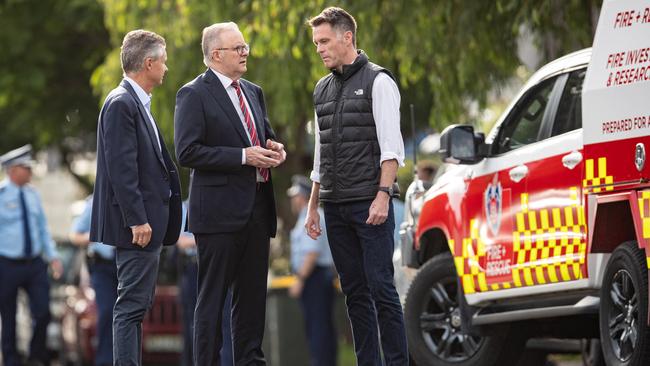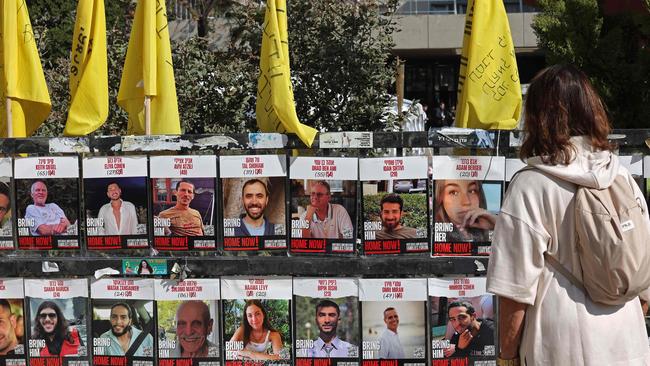
Anthony Albanese has denied for months the need for a meeting with state and territory ministers to stop the rising Jew hatred.
He was finally, reluctantly pushed into a meeting on Tuesday, yet the only outcome was an agreement “to establish a national database to track anti-Semitic crime and other anti-Semitic incidents and behaviours”.
Does this mean the police didn’t identify the need for more information sharing after the protests – celebrations, really – in Sydney and Melbourne after Hamas attacked Israel in October 2023?
If there was a failure of information co-ordination between agencies, a minister or senior official should be identified and dealt with as the accountable officer. If (as I suspect) information was flowing as it should, then the confection of a new database should be exposed as poor-quality political spin.
Even worse is the absence of strategic thought, of planning and informed thinking, going into Albanese’s management of a problem running off the rails for 15 months. On domestic security a fundamental role for government is to make sure the police and security agencies have their foot on the accelerator, putting the right priority to the task, collaborating with each other domestically and internationally. That type of focused and speedy co-operation doesn’t happen unless governments drive the demand for it, and do so relentlessly.
As a former senior public servant, when I hear comments to the effect that “co-ordination” is taking place, that agencies “are looking at” problems and “regularly talking” with trusted international partners, my reaction is that business-as-usual processes are grinding on.
If that’s true, it is just not consistent with the level of the risk coming from numerous attacks on property linked to the Jewish community.
At no stage in the past 15 months has the national response to anti-Semitism looked right.
At every point, more concerted effort has been dragged out of a reluctant Albanese.
The Prime Minister seems daily to be hurt and surprised that the media pushes him for more evidence that his government is energised and focused on the task.
When the head of ASIO, Mike Burgess, announced on August 5, 2024, that the national terrorism threat level was being lifted from “possible” to “probable”, he told a press conference: “At this stage we do not believe any of the terrorist plots we have investigated in the last year have been inspired by Gaza. Terrorist leaders offshore are not inspiring attacks on shore.”
Five and a half months later we have Australian Federal Police Commissioner Reece Kershaw saying: “We are looking into whether overseas actors or individuals have paid local criminals in Australia to carry out some of these crimes in our suburbs. We are looking into whether any young people are involved in carrying out some of these crimes, and if they have been radicalised online and encouraged to commit anti-Semitic acts. Regardless, it all points to the same motivation: demonising and intimidating the Jewish community.”

It is difficult to square these positions. Terrorism is a crime, and international organised crime and terrorism considerably overlap. Neither is it surprising that there may be connections between radicalising youth in Australia and individuals overseas grooming them.
Less than a decade ago several hundred Australians radicalised to the point that they left the country to join the Islamic State group in Iraq and Syria.
To get to that point they operated within networks in Australia that tolerated and, in some cases, encouraged radicalisation, and this was facilitated by extremist individuals overseas.
Across the past 15 months the war in Gaza has ignited a global protest movement, driven by Hamas and other extremist propaganda. We have seen the protests on our streets. We have seen the offshoots of the protests on campus and picketing politicians’ offices. Now there is the arson and other vandalism. Of course, “it all points to the same motivation”.
If parliament returns to sit for a few days in February, Albanese should use the opportunity to make a statement in the House of Representatives on the actions he has initiated to stifle anti-Semitism. He should use this as an opportunity to engage with Donald Trump and the leaders of the so-called Five Eyes countries – the US, Britain, Canada, Australia and New Zealand – to develop a shared plan of attack against international criminals and terrorists inciting anti-Jewish violence.
Albanese needs a circuit-breaker to restart a conversation with Israel after Australia’s extended criticism of the country for doing no more than defending itself. A new phase in relations with Israel could begin with discussions about drawing on the Israeli experience of countering anti-Semitism.

Domestically, Albanese should put together an all-source intelligence and policing team to work on anti-Semitism. My understanding is that state and federal efforts remain siloed.
Police and intelligence agencies have powerful, inward-looking cultures. That’s a fact, not a criticism; it’s a strength in their work, but it can mean that the insights to crack a counter-terrorism problem take time to develop.
I have seen all-source intelligence teams work very effectively on border control problems and on dealing with the Jemaah Islamiah threat in Indonesia after the Bali bombings.
On Wednesday, a decidedly tetchy Albanese went into great detail at a media doorstop justifying his anti-racism credentials by reference to his early 1980s days in student politics, founding a group called Students Against Racism.
With respect, Prime Minister, that’s almost a half-century ago.
After close to three years in office, Albanese has never cracked how he can drive government agencies to deliver considered, practical policy. Fondly remembering his student days fighting Tories does nothing to demonstrate leadership in attacking anti-Semitism today.
Peter Jennings is director of Strategic Analysis Australia.







Called in haste and held online, Tuesday’s national cabinet meeting shows the repeated failure of the Albanese government to get ahead of the anti-Semitic tide sweeping Australia.